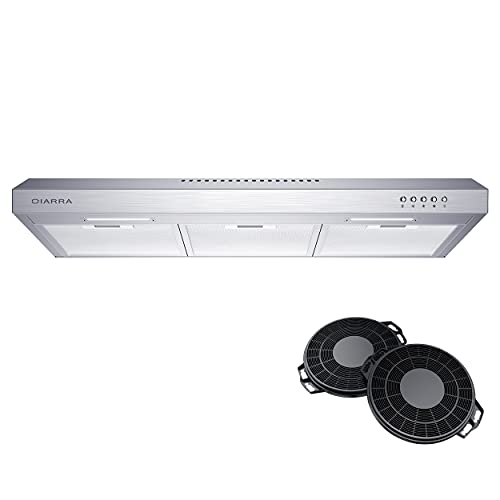Range hoods, while not the first thing I think of when it comes to kitchen appliances, have proven themselves essential time and time again. The fact that the International Residential Code requires range hoods with certain equipment and the general helpfulness of the appliance means it’s worth taking a closer look at.
Not just any old range hood will do for your kitchen. The building code is quite clear in defining what your range hood should be and how it must function. However, if you don’t work with the building code regularly, understanding the jargon and following all the rabbit holes can become a little confusing. So, I have put it all here to make it easier to use.
| Range Hood Venting by Topic | IRC Coordinates | Code Summary |
| Material | M1503.3 and M1503.4 | Smooth, rigid metal (sometimes PVC). |
| Airtightness | M1503.3 | Backdraft damper required. |
| Termination | M1503.3 | Outside (exception is made for ductless range hood). |
| Other exhaust systems | M1503.3 | Range hood must be independent of other exhaust systems. |
| Exhaust rate | M1505.4.4 | 25 CFM continuous; 100 CFM intermittent. |
| Makeup air | M1503.6 | Necessary if range hood is 400 CFM or more and if in the same room as certain fuel-burning appliances. |
| Duct dimensions | M1504.2 | Maximum allowable length depends on fan capacity, duct diameter, and number of elbows. |
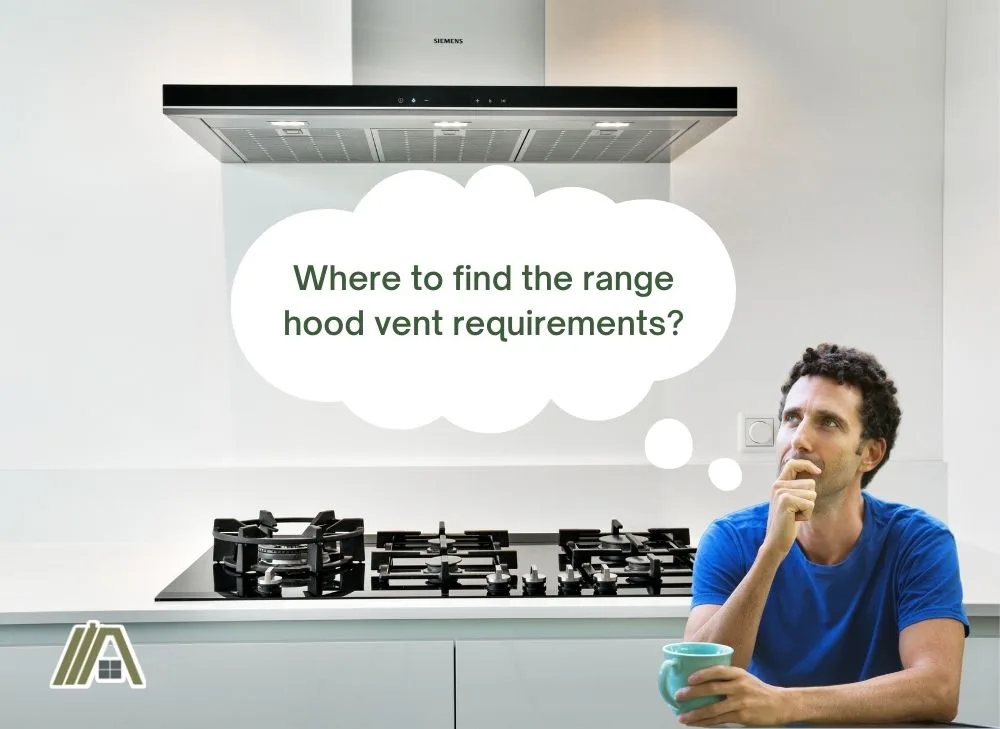
Where to Find the Range Hood Vent Requirements
You will find the general requirements for range hoods in Section M1503 of the International Residential Code (IRC).
It is also important that you check your local codes for any state- or area-specific modifications and amendments to the regulations provided by the IRC. The local American codes can be found on this site.
In the local codes, you may come across certain sections that are greyed out, like in the California Residential Code, which means that the rules are included elsewhere. Using California for example, there is a separate California Mechanical Code that contains the regulations for range hoods (under Chapter 5: Exhaust Systems).
What you find in this code will likely be similar to what you will find in the IRC itself, but there will definitely be differences. In comparison, the local codes for Michigan are almost identical to the international guide, aside from marginal adaptations.
Unfortunately, we cannot look at all the local codes for America in this article, never mind from around the world. So instead, we will focus on the international regulations provided in the IRC, which are widely applicable.
Vent Material Requirements
The IRC specifies the composition of your range hood; it is concerned with interior surface, airtightness, and the material the entire unit is made from.
Interior Surface and Airtightness
Section M1503.3 requires that range hoods have an interior duct surface that is smooth. It must also have a backdraft damper to make the duct airtight against backdrafts; this is because the air that is exhaust should not be allowed to return through the duct.
It is essential for the duct to have a smooth surface to allow the hood to effectively exhaust the particle-ladened air and steam, without too much resistance and areas for dirt and airflow to catch.
Type of Material
The IRC, Section M1503.4, requires that range hood ducting be constructed from stainless steel, galvanized steel, or copper. These metals are durable, easy to clean, and resistant to damage and rust.
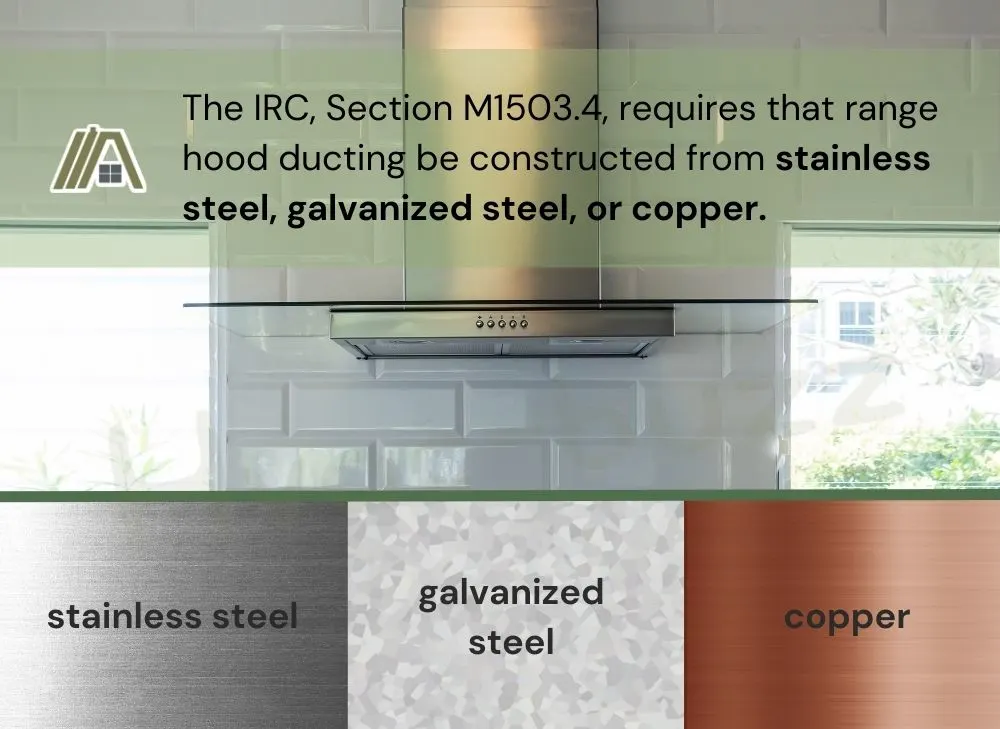
This is important when you consider that range hoods are designed to remove steam and grease that contain substances that might pollute your breathing air.
For the most part, range hood ducts are constructed from metals; the IRC even refers to the range hoods as metal in the code in a general manner. However, sometimes you qualify for the exception and can use PVC if it is underground.
Ducting can be made of schedule 40 PVC if it complies with all these factors:
- It must be installed under a concrete slab that is poured on grade (ground level).
- The underfloor trench it’s in must be entirely backfilled with either gravel or sand.
- It cannot be more than 1” above the concrete floor surface inside.
- It cannot be more than 1” above the outside grade.
- It must be solvent cemented.
Termination of Range Hood Vent
A range hood vent is not permitted to terminate in an attic or crawl space; according to Section M1503.3 of the IRC, domestic exhaust equipment for cooking needs to vent outside through a duct.
Range hood ducts cannot terminate inside your home, including in a crawl space and attic. They can terminate through the roof, the wall, or the soffit.
Section M1503.3 also states that your range hood duct must have a backdraft damper at the termination point.
This adds to preventing exhausted air from being returned to the kitchen. A backdraft damper is designed to let air through the vent in a single direction, while sealing against airflow coming from the other direction—in this case, from coming back into the kitchen.
What About Ductless Range Hoods?
Ductless range hoods are listed as the exception for the termination regulations in Section M1503.3 of the IRC. However, there are still certain requirements for a ductless range hood to meet in order to fall under this exception.
The ductless range hood must be installed per the manufacturer’s instructions and directions. The manufacturers are the experts on their own products and will have the most appropriate methods for installing the product, which is why the IRC entrusts this to them.
The IRC ensures that the products follow their approved standards by requiring them to be listed and labeled for use as a ductless range hood and for use without venting outdoors.
There must also be other mechanical or natural ventilation around the range hood, along with correct installation and approval for safe use.
The main advantage is that these range hoods do not require ducting. Instead, they use two filters to remove odors, gases, and grease from your kitchen air.
Unfortunately, they may not be as effective as they sounds. Ductless range hoods lack ventilation. This limits the amount of odor, gas, and grease they can filter. It also means that they cannot remove any steam or moisture.
So, is a ductless range hood worthwhile? This depends on your circumstance and kitchen needs. They are safe to use with gas stoves, and you are required to supply alternative ventilation alongside the hood anyway. But it may not be effective enough to suit your use of the kitchen.
Duct System Must be Independent
As with some other home exhaust systems, your kitchen range hood’s duct must be independent of other ventilation systems. It must be isolated and must be vented directly to the outdoors, as per IRC Section M1503.3.
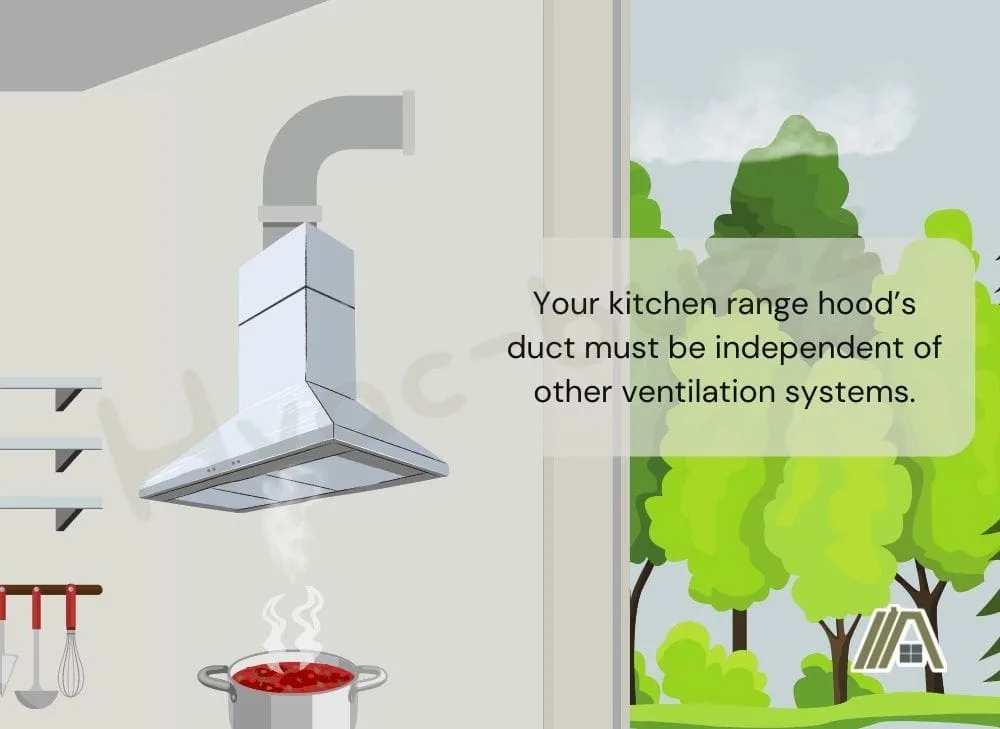
The reason that your range hood exhaust duct must be independent relates to why you install a range hood—to get rid of grease, steam, and cooking odors. Leaving this in your breathing zone can impact air quality. So, it is better to exhaust these outside of the house.
Whenever we have an exhaust system, the ducting is designed to promote the best airflow out of the duct and to be airtight, preventing waste air from leaking back into your home with a backdraft damper.
If you are connecting the range hood to another ducting system, it is possible that it won’t be headed outside as it should, as only exhaust ducts vent directly outside. The air may be returned to your HVAC system and deposited throughout the house. The ducting may not be airtight to prevent air from coming back through the range hood either.
In addition, you cannot combine another exhaust duct system with the range hood’s exhaust system because it will affect the airflow and may allow contaminants to re-enter the home.
The ducts have to bigger to accommodate simultaneous running of the two systems. Then if only one system is on at a time, there won’t be sufficient velocity pressure for effective exhausting.
Contaminants that are supposed to be exhausted by the one system can be diverted into the other. So you would end up with dryer lint coming out of your range hood, over your open flame broiler, which is terribly dangerous.
Minimum Range Hood Exhaust Rate
IRC Section M1503.5 refers you to Section M1505.4.4 for sizing the fan of your ducted range hood according to airflow in cubic feet per minute (CFM).
This section requires that your range hood have a 25 CFM continuous exhaust rate (you never turn the exhaust system off) or a 100 CFM intermittent exhaust rate (you only turn it on when you need it).
May Need to Provide Makeup Air
According to Section M1503.6 (IRC), if the exhaust rate of an appliance exceeds 400 CFM (0.19 m3/s), you will need to provide makeup air. This is the air that is being fed back into your home when an exhaust system has removed air.
It must be installed in the same room as the exhaust system, or in an adjoining space that has permanent openings to the kitchen (Section M1503.6.1).
This is required where you have any fuel-burning appliance that isn’t a direct-vent (vents directly outdoors) or doesn’t have a mechanical draft system (special venting system for a gas appliance that removes the gas byproducts).
The reason that you require makeup air in these circumstances is because the alternative would be to pull replacement air from the rooms containing the fuel-burning appliances. This pulls the toxic byproducts into the breathing air and distributes them to the kitchen.
Makeup air can be provided passively or mechanically, but it must match the exhaust rate (approximately) to maintain the air quality in your home.
Removing air without it being replaced can depressurize the house’s air system. This will lead to drafts if air can be pulled in from outside or, if it can’t, then there will be problems with exhausting air.
The makeup air system needs at least one damper (gravity/electrical), according to IRC Section M1503.6 and Section M1503.6.2, which opens automatically when the range hood is on. These dampers must be easily accessible so that you can inspect, repair, service, and replace them without needing to remove a permanent construction or other unconnected ducts.
It is important to note that you are not permitted to use barometric or gravity dampers with passive systems unless rated for providing airflow with a pressure differential of 0.1 w.c.
If you are looking for more information on duct sizes, check out my Range Hood Duct Length and Dimension Guide.
The Code on Range Hoods
Now that we know all that the code has to say about range hood vents, let’s have a look at what it says about range hoods themselves.
Are Range Hoods Required?
Section M1503.2.1 of the IRC requires that open-top broilers be equipped with a range hood (or down-draft exhausts).
There are also two exceptions to this rule.
Firstly, if the unit has a built-in exhaust system, you do not need to install a separate hood, provided the equipment is listed and labeled (in other words, IRC-approved) for use without an independent range hood. The other exception is if the broiler is listed and labeled for use without a hood.
While open-top broilers are the only type where a range hood is necessary, there are many benefits to installing a range hood anyway. In this case, you are not prohibited from installing a range hood or purchasing a broiler with an integral hood.
While we are focusing on the general range hood requirements for this article, I have also written several state-specific range hood posts.
| State/Area | Link to dedicated article |
| California | View |
| Colorado | View |
| Florida | View |
| North Carolina | View |
| Ohio | View |
| Ontario | View |
Must Comply With Standards
The IRC, Section M1503.2, lays out the standards that a domestic range hood must meet if you are installing one. This is to ensure that the exhaust, which is impacting your breathable air, follows the dimensions and specifications that make it appropriate and safe to install in your home.
The following accreditation codes should be included in the product’s information for them to be considered listed and labeled according to the IRC:
- The exhaust fan for an external range hood must be rated according to UL 507.
- Equipment with an integral fan must adhere to UL 507.
- A range hood with an integral exhaust must comply with ANSI Z21.1 or UL 858.
- A microwave oven with a built-in exhaust that sits over the cooking surface must be rated according to UL 923.
These safety and performance standards are regulated by two organizations: Underwriters Laboratories (UL) and the American National Standards Institute (ANSI).
- Underwriters Laboratories is an organization that tests and regulates the safety of different appliances and household equipment, including range hoods.
- The American National Standards Institute aims to regulate conformity, performance, and safety to help provide the consumer with the highest quality of products.
These organizations are providing quality control. The standards they provide allow the IRC to approve of the systems in place in these organizations, meaning it can provide you with markers for good performance instead of needing to list every new, old, and upcoming range hood in the building code.
Material and Thickness
Section M1503.2.1 of the IRC addresses the thickness of the material that the range hood is made from. The metal hood of your open-top broiler must be at least 0.0157″ (0.3950 mm) thick. This is also referred to as 28 gage.
Indoor Clearances
Clearances are important when it comes to the range hood to keep everything safe and prevent damage to your kitchen fixtures. According to Section M1503.2.1 (IRC):
- There must be at least 1/4”, or 6.4 mm, of space between the range hood and the underside of combustible materials and cabinets.
- There must also be at least 24” (610 mm) of space between any combustible materials and cabinets and the cooking surface of the broiler.
- The range hood must match the width of your broiler and cover the whole unit.
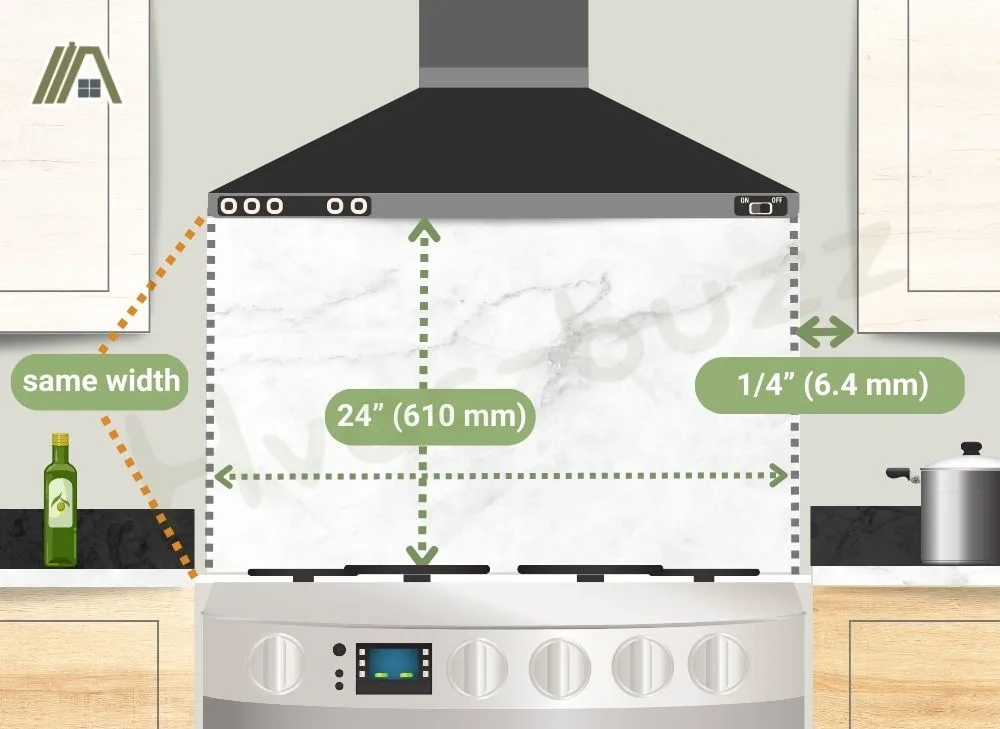
Of course, the exceptions (a broiler with an integral range hood or one listed and labeled for use without) still apply here.
Sources
https://www.ansi.org/about/introduction
https://www.worldcoppersmith.com/articles/benefits-stainless-steel-range-hoods/
https://www.cambridgeair.com/make-up-air
https://www.lawinsider.com/dictionary/mechanical-draft-system

